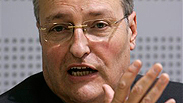
Jewish groups protest art installation at Polish museum
Simon Wiesenthal Center calls video shows naked men and women playing a game of tag in a gas chamber 'offensive and disgusting.'
Efraim Zuroff, director of the Simon Wiesenthal Center's office in Jerusalem, called the installation at the Museum of Contemporary Art in Krakow (MOCAK) "so offensive and so disgusting that we found it necessary to protest."
"Game of Tag," made in 1999 by Polish artist Artur Zmijewski, has for years been accused of taking the Holocaust lightly.
It was displayed among the works of more than 20 artists at a temporary exhibition on the Holocaust running from May 15 through October 31. Zmijewski's video has been shown at museums in Germany and Estonia, where it has also caused protests.
The film was initially screened as part of an exhibition that enjoyed the patronage of the Israeli Embassy in Warsaw. The embassy eventually withdrew its support and the exhibit was discontinued, but later reinstated by MOCAK.
The World Jewish Congress (WJC) and Yad Vashem, Israel's Holocaust memorial, have also asked the museum to remove the installation.
In response, the museum recently put it behind an enclosure with a warning.
But Zuroff and other Jewish officials say it isn't enough. Zuroff said it is "simply incomprehensible" that the video is being shown in Poland, where Nazi Germany killed millions of Jews and non-Jews.
World Jewish Congress President Ronald S. Lauder said, "Despite the protestations of Shoah survivors and many others, Jews and non-Jews alike, the museum continues to show an exhibit that hurts many people’s feelings. We urge the MOCAK to immediately remove this exhibit."
He added, "We are very disappointed that a distinguished museum like the MOCAK would screen a film that causes extraordinary anguish to Auschwitz survivors and many others to whom the Holocaust is not a remote event in history, but rather serves as an enduring warning about the dangers of anti-Semitism, racial hatred and xenophobia.
"Whatever the legality of that decision, we can only express shock that sensationalism in the guise of freedom of artistic expression should trump sensitivity and goodwill, and, of all places, Krakow should show some sensitivity to the feelings of survivors."
Jonathan Ornstein, the executive director of the Jewish Community Center of Krakow, a city with a once-vibrant Jewish community nearly wiped out in the Holocaust, said survivor groups from around the world have contacted him recently to tell him how upset they are.
"They feel that it shows a lack of respect for the victims, that it is not necessary and that it takes the Holocaust lightly," Ornstein said.
The museum's director, Maria Anna Potocka, said in a statement on Tuesday that her museum means no disrespect to the memory of the Holocaust, saying "we have tried to awaken (the) young generation's empathy with the tragedy of the Holocaust by stirring their imagination."










